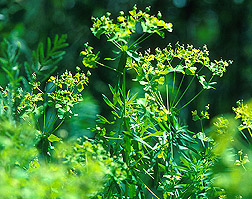This page has been archived and is being provided for reference purposes only. The page is no longer being updated, and therefore, links on the page may be invalid.
|
Read the magazine story about TEAM Leafy Spurge and other ARS projects of areawide pest management. |
Banding Together to Stall Leafy SpurgeBy Linda McElreathNovember 16, 2001 Say the phrase "noxious weed," and many ranchers in the western United States will mutter, "leafy spurge." After its initial appearance in this country in 1827, this persistent invader thrived and spread, doubling its coverage every decade for 100 years and moving into at least 36 states and Canadian provinces pretty much unchecked. Native grasses couldn't compete with it, and animals wouldn't graze on it. Then scientists and land managers got serious about teaming up to stall this constant spread. Led by Agricultural Research Service ecologist Gerry Anderson, cooperators from several federal agencies, land-grant universities, state cooperative extension services, ranchers and others embarked on an areawide containment program in 1997 that they dubbed TEAM Leafy Spurge, for "The Ecological Areawide Management" (TEAM) of Leafy Spurge. This was the first time in the United States that an areawide effort was undertaken to stop the spread and shrink the territory of a pernicious weed. Tactics included setting up a four-state demonstration area in which to try strategies in different habitats over differing terrains. Field events showed the effectiveness of various controls, used both alone and in combination, including grazing by sheep as well as the use of herbicides and weed-consuming flea beetles, of which more than 47 million were distributed for release. More information about this precedent-setting initiative appears in the November issue of Agricultural Research magazine, available on the World Wide Web. ARS is the U.S. Department of Agriculture's chief scientific research agency. |

